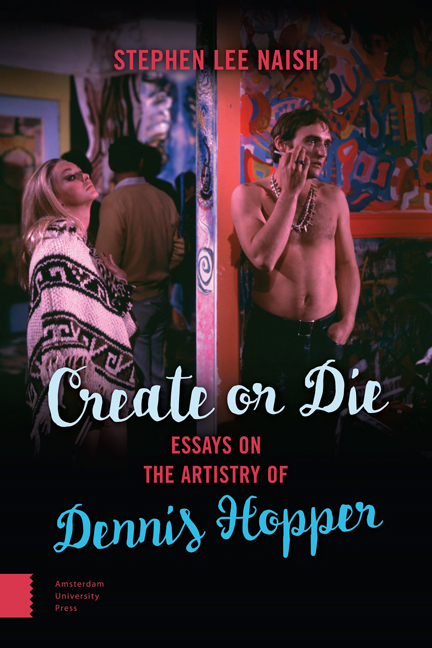Book contents
- Fronmatter
- Dedication
- Contents
- Introduction
- Scenes from a Revolutionary Life: How Dennis Hopper Conquered the American Century
- Hip-Hopp: Dennis Hopper and Music
- The Elephant in the Room: Dennis Hopper and American Politics
- Love and Hate: The Conflict of Emotions in The Blackout and Carried Away
- Commercial Breakdown: Dennis Hopper in the World of Advertisements
- White Light/White Heat: Actor and Character Collide in White Star
- Double Standards: The Art and Photography of Dennis Hopper
- Coda: The Fourth Wall
- Acknowledgements
- Notes
- Bibliography
Love and Hate: The Conflict of Emotions in The Blackout and Carried Away
Published online by Cambridge University Press: 11 December 2020
- Fronmatter
- Dedication
- Contents
- Introduction
- Scenes from a Revolutionary Life: How Dennis Hopper Conquered the American Century
- Hip-Hopp: Dennis Hopper and Music
- The Elephant in the Room: Dennis Hopper and American Politics
- Love and Hate: The Conflict of Emotions in The Blackout and Carried Away
- Commercial Breakdown: Dennis Hopper in the World of Advertisements
- White Light/White Heat: Actor and Character Collide in White Star
- Double Standards: The Art and Photography of Dennis Hopper
- Coda: The Fourth Wall
- Acknowledgements
- Notes
- Bibliography
Summary
Dennis Hopper was never a typical leading man. His edgy movements, abrupt hysterical voice, and menacing stare were enough to frighten even the most depraved objects of his character's desires. In his analysis of Hopper's career, film critic Adrian Martin describes Hopper as “short, no neck, square, and solid, a little beefy, but still quite handsome…”. Although certainly handsome in his youth and later a somewhat distinguished older gentleman with a mischievous glint in his eye, “short”, “square”, and “a little beefy” were hardly the desired look of a leading man. Hopper ranks among a group of actors—mostly those designated as character actors— whose mannerisms and looks are too strange for the role of the romantic lead. If they are cast in such a position, then they often mutate into the menacing, bleeding heart of love and infatuation: in Hopper's case, the obsessive controller in Blue Velvet, the abusive drunken husband in Eye of the Storm (1991), the pitying simpleton in Held to Ransom (2000), the outcast weirdo in The River's Edge, the outspoken and controlling egotist in Search and Destroy (1995), or the compulsive killer in Speed. Love, or perhaps romantic love, rarely plays a crucial part. Martin observes that “Sex scenes are strikingly rare in his filmography, and tend to be deliberately perverse or shocking…”. This phenomenon is witnessed from Tracks to Blue Velvet and beyond. Rarely is a sex scene carried out with tenderness and caring. That being said, nestled within his extensive catalogue of films is Carried Away (1996, also released as Acts of Love), a tale of love and tenderness in the throes of middle age and the search for excitement and joy within the confines of a tired relationship. Carried Away sticks out like a blackened thumb in Hopper's film work, if only for the fact that his character is for all intents and purposes the romantic hero of the piece, a claim that cannot be awarded to most, if any, of Hopper's output. However, the film is threaded with a dark underbelly of jealousy and a loss of innocence that shimmers just underneath the quaint surface. The film's tenderness is poisoned by a bitter love triangle that transforms the lives of those involved. This premise is strangely mirrored in The Blackout (1997), although the dark underbelly that lies within The Blackout is disturbingly brought to the surface.
- Type
- Chapter
- Information
- Create or DieEssays on the Artistry of Dennis Hopper, pp. 59 - 70Publisher: Amsterdam University PressPrint publication year: 2016



